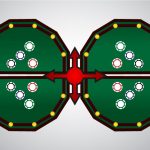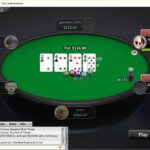When I interviewed Kingsofcards for my weekly interview, one comment he made about heads up changing his game rung a bell with me.
Until after playing HU, when playing 6 max I never really took into account bet sizing, timing tells or things like that nearly as much so I guess playing HU just made me more aware of the flaws in my game and the flaws of playing sessions in “robot mode” and just defining people at a 21/16 who 3-bets light. Rather than a tricky tag who 3-bets light; a tricky tagg who calls 3-bets a little too wide, gives up in 3-bet pots easily and likes to float dry boards in position.
What KOC meant by this is instead of just generalizing his opponents and saying “tag” or “lagg” and basing his decisions off of that estimation, he instead began to be more specific. He began to note every facet of his opponent’s game (something that really only can be done when playing few tables, which KOC noted helped him breakthrough). Even more specifically, he began to note his opponents frequencies in every decision. So what I do, and I recommend you do, is make adjustments to your opponents based on high frequency moves and low frequency moves.
For example if my opponent doesn’t c/r on the flop much, an adjustment I would make is to cbet nearly 100% of flops. Let’s say an opponent doesn’t threebet very much, an adjustment I would make would be to open preflop with more hands. These adjustments are based on low frequency of opponents decisions.
With high frequency, adjustments are a little different and harder. Let’s say instead of c/r a flop very little, our opponent spastically c/r the flop, maybe 50% of the time when we cbet. Well, there are a few adjustments we can make here. The first one is essentially a must: cbet less. But the other two take a lot more thinking.
1. Threebet a wider range of the flop
2. Call a wider range on the flop to the c/r
What we decide to do is dependent on a lot of variables. One would be after opp c/r the flop, does he follow through on the turn a lot? If he doesn’t, calling may be the better option, as we can either take the pot away with a bet on the turn, or play a mid-pair type hand fairly easily. Another could be the skill of our opponent; he bluffs but not too much, thin value bets well, and makes solid laydowns. This would be an argument for threebetting, as the only place in this scenario which our opponent is doing something too frequently is on the flop. One thing you may want to note is doing something too much makes life much harder for your opponent than doing something too little
When you move to higher levels, or when you want to try some heads up, you absolutely cannot win without adjusting. Hopefully this article will lead you on the right track to adjusting mastery!
Submit your review | |









